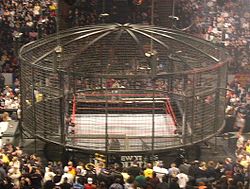Storylines
The professional wrestling matches at SummerSlam featured professional wrestlers performing as characters in scripted events pre-determined by the hosting promotion, World Wrestling Entertainment (WWE). [6] [7] Storylines between the characters were produced on WWE's weekly television shows ( Raw , and SmackDown! ) with the Raw, and SmackDown! brands—storyline divisions in which WWE assigned its independent contractors to different programs. [8]
In the first main event of SummerSlam, wrestlers from the Raw brand competed in an Elimination Chamber match. The match was contested for the World Heavyweight Championship, in which Triple H defended the title against Chris Jericho, Goldberg, Kevin Nash, Randy Orton, and Shawn Michaels. The buildup to the match began on July 22, when during the SummerSlam press conference, the Raw co-general manager Eric Bischoff, announced that Triple H would defend the World Heavyweight Championship against Goldberg in a singles match at SummerSlam. [9] [10] On the August 4 episode of Raw, Bischoff changed the stipulations of the match to No disqualification regulations. Later during the episode, co-general manager Stone Cold Steve Austin altered Bischoff's announcement, stating that the World Heavyweight Championship would be contested in an Elimination Chamber match, with Triple H defending his title against Goldberg, Jericho, Nash, Orton, and Michaels. [11] [12] On the August 18 episode of Raw, the rivalry among the six competitors intensified during a promo, in which each participant in the Elimination Chamber discussed the match, and taunted the other wrestlers. During the show's main event, in which Orton wrestled Goldberg, Nash interfered in the match, and attacked Goldberg. Michaels then came down to the ring, but as he was about to hit Triple H with the World Heavyweight Championship belt, Jericho ran into the ring, and hit Michaels with a chair. [13] [14]
The second main event resulted from events on the SmackDown! brand. In the match, Kurt Angle defended his WWE Championship against Brock Lesnar. The build-up to the match began on the July 31 episode of SmackDown!. During an interview promotion in the ring, Lesnar challenged Angle to a rematch after Angle won the WWE Championship from him at Vengeance in a triple threat match (also involving Big Show). Vince McMahon decided that Lesnar would have to earn his rematch by competing in a steel cage match against McMahon himself with Angle officiating as a special guest referee. [15] [16] On the August 7 episode of SmackDown!, the steel cage match resulted in neither wrestler winning the match, after Lesnar attacked Angle, and formed an alliance with McMahon. [17] [18] On the August 14 episode of SmackDown!, McMahon announced that Angle would defend the WWE Championship against Lesnar at SummerSlam. [19] [20]
In a preliminary match involving wrestlers from the Raw brand, Rob Van Dam wrestled Kane under No disqualification regulations. The events leading up to this match began on the June 23 episode of Raw, when Kane took his mask off, and exposed his face in front of Van Dam, and the crowd after he lost to Triple H in a match for the World Heavyweight Championship (which was the stipulation) before chokeslamming Van Dam. On the July 7 episode of Raw, Kane attacked Van Dam backstage. [21] [22] On the July 14 episode of Raw, Eric Bischoff granted Van Dam a standard match against Kane, [23] [24] which took place on the July 21 episode of Raw, and ended in neither wrestler winning the match. [9] [10] On the August 4 episode of Raw, Shane McMahon scheduled a No Disqualification match between Kane, and Van Dam for SummerSlam. [11] [12]
In another preliminary match, wrestlers from the SmackDown! brand competed in a fatal four-way match for the WWE United States Championship: Eddie Guerrero defended the title against Chris Benoit, Rhyno, and Tajiri. The buildup to the match began with two different rivalries; one between Guerrero, and Tajiri, and the other between Benoit, and Rhyno. On the August 7 episode of SmackDown!, Guerrero, and Benoit wrestled in a standard match. However, during the match, Rhyno, and Tajiri interfered, resulting in neither wrestler winning the match. Sgt. Slaughter, a WWE official, scheduled a tag team match between Guerrero, and Rhyno, and Benoit, and Tajiri, which Benoit, and Tajiri won. [17] [18] On the August 14 episode of SmackDown!, it was announced that Guerrero would defend the WWE United States Championship against Benoit, Rhyno, and Tajiri at SummerSlam. [19] [20]


